STEPs4GROWTH program creates the next generation of skilled clean energy workers
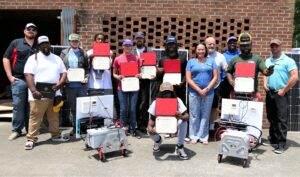
STEPs4GROWTH (S4G) is a Clean Energy Workforce Development grant led by North Carolina Agricultural and Technical State University’s (NC A&T) Center for Energy Research and Technology. This grant allows for Clean Energy (CE) industries and organizations to partner with educational institutions in North Carolina to build a workforce training and employment system. Executive Order 246, signed by NC Governor Cooper in January 2022, includes an array of goals focused on expanding CE within the state. S4G focuses on four CE sectors including energy efficiency, renewable energy, clean vehicles, and grid and resiliency. The project is catered towards college students, high school graduates, and reskilled or displaced workers in underserved communities to produce the next generation of experienced CE individuals. Equity, sustainability, cost-effectiveness, scalability, and worker-needs are the five fundamental pillars for success in the project’s framework.
The North Carolina Clean Energy Technology Center (NCCETC) leads the renewable energy sector for S4G, which covers solar, wind and biomass energy. NCCETC partners with four technical training education partners, including Martin, Roanoke-Chowan, Craven, and Carteret Community Colleges, to develop renewable energy learning pathways and job training.
Within these four educational institutions, instructors from various backgrounds lead the training program, and connect with students to build a talented class of skilled individuals who will go forth into CE sectors. Each instructor has a unique way of connecting with the students in their program to not only teach them technical skills, but to build their confidence in their professional selves and prepare them for a fulfilling career.
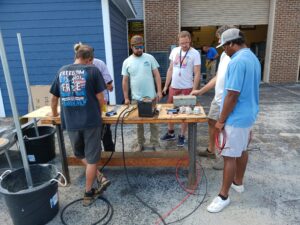 Tim Mason, an instructor and previous electrical school student at Carteret Community College, has a background in construction management and has also worked for a plumbing, heating, air and electric company for several years. In his curriculum, he shared his various experiences with students to engage them in the program. Once they started the hands-on portion of the class, Mason could see his students start to understand how each step connected to the next and watched their interest in the field grow with each demonstration.
Tim Mason, an instructor and previous electrical school student at Carteret Community College, has a background in construction management and has also worked for a plumbing, heating, air and electric company for several years. In his curriculum, he shared his various experiences with students to engage them in the program. Once they started the hands-on portion of the class, Mason could see his students start to understand how each step connected to the next and watched their interest in the field grow with each demonstration.
Another important component of the course are the soft skills the students learn. Ja’Queta Gatling, one of the instructors for S4G at Roanoke-Chowan Community College, is certified in “Working Smart”, a training program designed to teach soft skills that will prepare participants to be successful in the workplace. Gatling teaches self-awareness, self-management, work ethics, communication, and problem-solving skills in a hands-on format, using creative real-world scenarios to connect with the students. Gatling says she was “so grateful to be able to facilitate this because of what it delivers”. These skills allow the students to apply a different mindset to their everyday lives, which will in turn help them in their professional careers down the line.
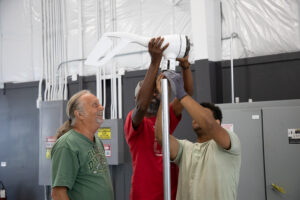 At Craven Community College, Jeff Brown and Greg Gahlinger led their students in hands-on, cost effective lessons. After learning the technical skills and necessary electrical aspects, they were able to tie it together with a do-it-yourself solar and wind kit. Brown, who has taught at the college for about 20 years, says “the students were able to grasp what each component did, they actually had to wire everything up from scratch”. Gahlinger notes that an understanding of wind turbines and solar panels allowed the students to weigh the pros and cons of each, which will be important when having a combined solar and wind renewable energy system. In any hands-on operation, there are potential challenges, and this class had an opportunity to troubleshoot after an electrical component of a system malfunctioned. Brown and Gahlinger recall the students doing the hookups properly, but a charge controller happened to start burning. Several of the students realized there was a burning smell, and reacted quickly to turn everything off and figured out which system it was. The students handled themselves professionally in an unpredictable event, which will be vital to the clean energy workforce. Within the CE field, Operations and Maintenance Technicians are crucial to ensure long-term performance of a system. Their responsibilities include on-site troubleshooting and analyzing system efficiency, which these students were able to experience in this situation.
At Craven Community College, Jeff Brown and Greg Gahlinger led their students in hands-on, cost effective lessons. After learning the technical skills and necessary electrical aspects, they were able to tie it together with a do-it-yourself solar and wind kit. Brown, who has taught at the college for about 20 years, says “the students were able to grasp what each component did, they actually had to wire everything up from scratch”. Gahlinger notes that an understanding of wind turbines and solar panels allowed the students to weigh the pros and cons of each, which will be important when having a combined solar and wind renewable energy system. In any hands-on operation, there are potential challenges, and this class had an opportunity to troubleshoot after an electrical component of a system malfunctioned. Brown and Gahlinger recall the students doing the hookups properly, but a charge controller happened to start burning. Several of the students realized there was a burning smell, and reacted quickly to turn everything off and figured out which system it was. The students handled themselves professionally in an unpredictable event, which will be vital to the clean energy workforce. Within the CE field, Operations and Maintenance Technicians are crucial to ensure long-term performance of a system. Their responsibilities include on-site troubleshooting and analyzing system efficiency, which these students were able to experience in this situation.

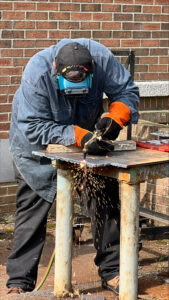
Dwayne Evans, an instructor for the S4G course at Martin Community College, describes the program as holistic, and aimed for graduates to be prepared for entry-level solar installation positions. The training included career readiness counseling, basic electrical fundamentals, manufacturing processes, hands-on labs, welding, and solar energy system components. Evans says the program was special due to the topics included, “this made for a very well-rounded training scenario that benefits the student and a future employer”. He also observed the students become more confident throughout the course and even engaged in further discussions about practices they could implement to be more energy efficient. In addition to learning the technical and hands-on skills, Evans required his class to write a paper at the end of the course, stating “being able to communicate and express your thoughts in the workforce is important”. A few of his students came back to the college to take additional programs. Two students had previously worked as laborers for a large solar installation but had left that job prior to taking the course. Following their graduation, they both contacted their previous employer to see if there was an opportunity for growth in that industry, as they had a better understanding of the field.
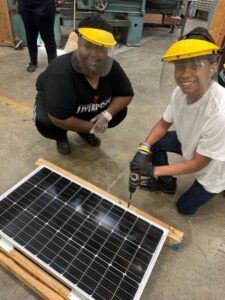 The use of interdisciplinary learning in this program allows students to leave the course with a greater understanding of renewable energy concepts, along with the necessary professional skills that will prepare them for the workforce. S4G gives individuals an opportunity to obtain hands-on experience in a growing industry with the help of experienced instructors who strive to see their students succeed throughout the course. NCCETC joined this initiative because of the potential benefits to the economy, the people, and North Carolina’s place as a clean energy leader. The opportunity to collaborate across the university and community college system to industries and local communities has allowed for insight into new learning and training pathways. The Center has been able to build new connections through this program, leading to better systems to serve communities in North Carolina, as well as the CE industry as a whole. Moving into year two of the program, NCCETC is excited to learn ways to further benefit the communities served by S4G.
The use of interdisciplinary learning in this program allows students to leave the course with a greater understanding of renewable energy concepts, along with the necessary professional skills that will prepare them for the workforce. S4G gives individuals an opportunity to obtain hands-on experience in a growing industry with the help of experienced instructors who strive to see their students succeed throughout the course. NCCETC joined this initiative because of the potential benefits to the economy, the people, and North Carolina’s place as a clean energy leader. The opportunity to collaborate across the university and community college system to industries and local communities has allowed for insight into new learning and training pathways. The Center has been able to build new connections through this program, leading to better systems to serve communities in North Carolina, as well as the CE industry as a whole. Moving into year two of the program, NCCETC is excited to learn ways to further benefit the communities served by S4G.